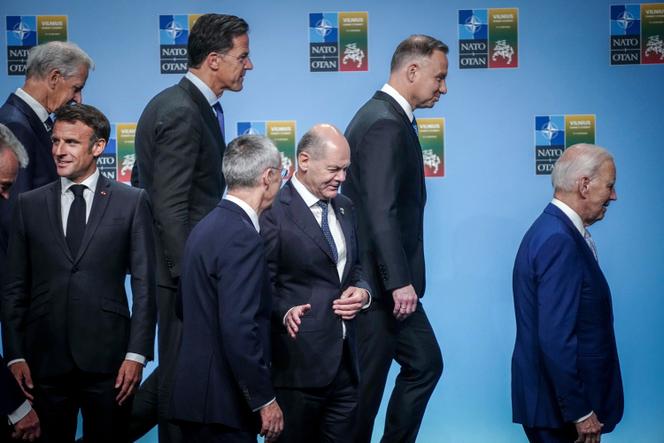


They were all expected to be there to demonstrate their unity as they celebrated 75 years of NATO in the midst of the war in Ukraine. In the wake of the second round of legislative elections, only Emmanuel Macron is expected to be absent on Tuesday, July 9 in Washington, having delayed his arrival due to the political crisis triggered in France by the dissolution of the National Assembly. The head of state – who avoided a cohabitation with the far-right Rassemblement National – is not expected to arrive until Wednesday, for two days.
His absence on Tuesday evening alongside Joe Biden gives an idea of the degree to which not just France, but Europeans within the alliance, are weakened after thirty months of conflict in Ukraine. "Five years ago, a few weeks before NATO's 70th anniversary in London, Emmanuel Macron appeared very sure of himself, diagnosing NATO's 'brain death'. Five years on, this is no longer the case," says Samuel Faure, a specialist in defense issues at Sciences Po Saint-Germain-en-Laye.
German Chancellor Olaf Scholz is not in the best political shape either, following the Socialist Party's setback in the European elections. On the contrary, the vote has strengthened pro-Russian or isolationist groups across much of the continent, led by France.
What's more, the two European leaders differ on the Alliance's most sensitive issue of the moment: Ukraine's trajectory towards NATO, with Russia occupying almost a fifth of its territory and fighting raging. Germany is making common cause with the US to refuse Kyiv's joining into the Alliance, so as not to provoke an escalation with the Kremlin. France, on the other hand, is pleading with most of the Central European countries, but also with the UK, to pave the way for its Atlantic integration.
"The idea is to show that this trajectory, in a way, is irreversible. We're going further than what was decided in Vilnius [Lithuania]," at the previous Alliance summit in July 2023, says a source at the Elysée. At the time, Ukrainian president Volodymyr Zelensky, anxious to join the organization as soon as possible, had annoyed American officials by deeming the formula negotiated at the time of membership "absurd": Ukraine will receive an invitation "when the allies agree and the conditions are met," the US had said.
Even if the debate is likely to be more polite in Washington, the discussion nonetheless generates frustration in some parts of Europe, starting with Ukraine. "The Biden administration has always been excessively cautious, which will now backfire on them and us. Every time we say 'no escalation', we send a signal to [Vladimir] Putin, who takes advantage of it to escalate," says former diplomat Michel Duclos, an expert with the Institut Montaigne. "This creates resentment in Ukraine. We're going to have to deal with a divided and frustrated Ukraine."
You have 62.41% of this article left to read. The rest is for subscribers only.
